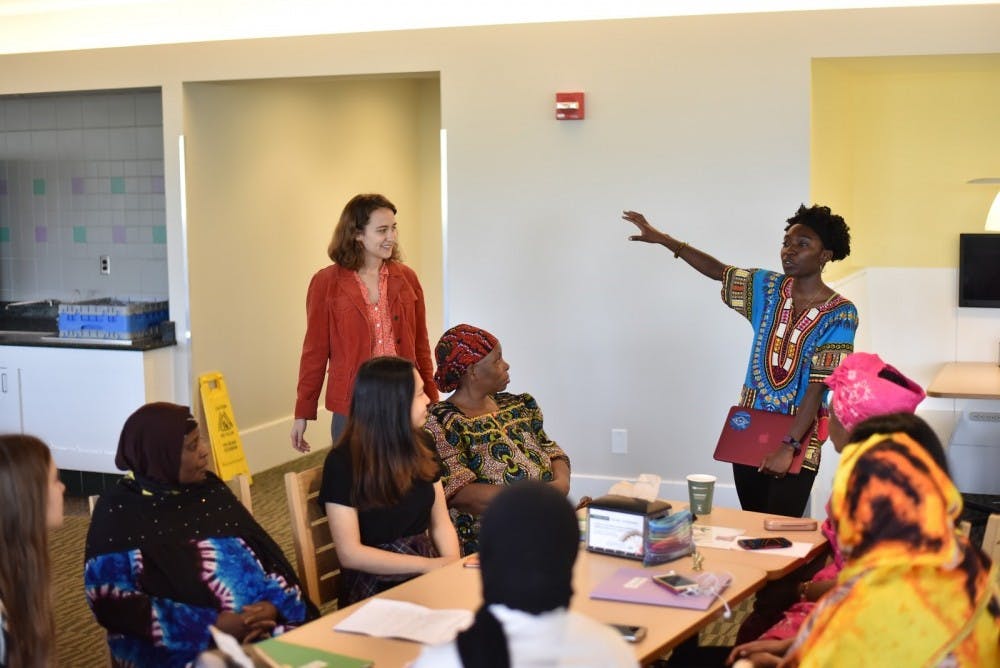There are countless organizations on Grounds aiming to make the University a better place, but for Colombia native Karolina Naranjo, one in particular has had the greatest impact on her time here in Charlottesville — the Volunteers with International Students, Staff and Scholars.
Karolina Naranjo joined the VISAS program as an English Language Learner last year. Naranjo is the spouse of a U.Va. faculty member, and she discovered the program when she saw a flyer for it on Grounds. Originally a native of Colombia, she is currently a visiting scholar and working on research at the University of Virginia School of Law. She was especially excited about the space VISAS provided to meet new people.
“The VISAS program is an opportunity to make friends and to be connected with community — Charlottesville community — and especially international students,” Naranjo said. “So after I enjoyed 12 months of the VISAS program, I could say that I made friends [and] I improved my English.”
VISAS is made up of eight programs aimed at fostering dialogue between domestic volunteers and international members of the University community. The program currently has 364 international participants and 236 volunteers. VISAS is part of the University’s Center for American English Language and Culture, and its goal is to provide English Language Learners with a safe space to practice English and refine their knowledge of American culture.
Elizabeth Wittner, the academic director and international TA program coordinator for VISAS, founded the program 20 years ago because she recognized a desire among domestic and international community members alike to get to know people of other cultures and learn how to better relate to each other.
“When I asked my ESL graduate student in class … ‘How often do you speak English?’ it’s like an hour or less a day,” Wittner said. “I always thought that by immersion they would be learning the language and learning the culture, but there are such silos for all of us. It’s gotten really hard to meet people.”
VISAS’ most popular program is its Language Consultant program, in which small groups of ELLs meet with a native speaker for an hour a week and engage in casual English conversations. The LC groups decide among themselves where to meet across Grounds. However, VISAS also has programs geared toward international TAs, staff at the University and their families and community members. All VISAS’ programs are free for ELLs.
Anyone at the University — from faculty to staff to community members — interested in having engaging conversations with international participants can apply to volunteer with VISAS. Interns, who are volunteers with at least a semester of experience who commit to help on-staff for a year, participate in an orientation week at the beginning of every school year. Orientation week involves preparing curriculum and recruiting volunteers and international participants. ELLs do not have to apply for the VISAS program, and they can register at the beginning of the semester on the VISAS website.
“One of the things I respect the most about VISAS is that its very much a mutual exchange, and [it is] as much about learning about people that are coming to Charlottesville and making their homes here, trying to figure out the school system here, as it is about doing something as a volunteer,” said Emma Westerhof, a fourth-year College student and VISAS intern.
Fourth-year College student Jenny Lim emigrated from South Korea when she was 12, so she sympathizes with the difficulties that ELLs face.
“It’s one thing to be able to academically write or speak, but another thing to really understand American culture,” Lim said. “The first program I got involved with was the ESL assistant program because I was an ESL student when I first came and so I wanted to kind of give back as a student.”
Similarly, fourth-year College student Mira Sridharan got involved with VISAS because of her experience as a young child editing chemistry lesson plans for her mother, a high-school teacher and first-generation immigrant to America.
“When [Sridharan’s mother] was first getting started teaching, she’d pitch her chemistry lessons to me, to be like ‘Is my English right? Is my grammar right?’” Sridharan said. “I know my mom would have loved to have such a program, so it meant so much for me to get involved and be that for someone else.”
VISAS Program Coordinator Trecia Gunnoe explained what makes this particular program so unique.
“When Liz [Wittner] travels … everyone asks ‘How do you get all of these students to [volunteer]?’... and she says, it’s just the culture at the University,” Gunnoe said. “There’s no program like this in the country.”
Volunteers and ELLs alike treasure this program for its unique ability to bring people of different backgrounds together.
Naranjo noted that even though she has had to struggle to learn English, her work has paid off in the long run. She provided some encouragement to other individuals striving to learn English.
“English requires a lot of work,” Naranjo said, “The learning process seems sometimes difficult but … English is like love — it’s try, and try, try, try, try, try and never give up.”







